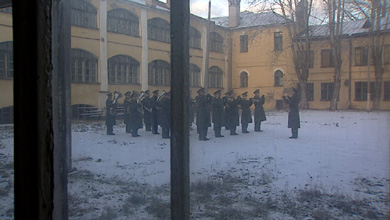Epoca - The Making Of History
Andreas Hoessli, Isabella Huser
Schweiz 2002 |
| |
|
 |
|
|
Delphi
10.02.,16.30
CinemaxX 3
11.02.,15.30
Arsenal 1
11.02., 22.00
Babylon
12 .02., 14.00
|
|
|
|
|
Produktion und Weltvertrieb: Espaces Film
Dienerstr. 7, 8004 Zürich, Schweiz
Tel.: (411) 241 16 64
e-mail: espacesfilm@access.ch
Kamera: Matthias Kälin, Pio Corradi
Schnitt: Isabella Huser, Andreas Hoessli,
Kamal Musale
Sound-Design: Kamal Musale
Originalmusik: Peter Scherer
Sprecher: Bruno Ganz
Ton: Wojtek Mrozek, Dieter Meyer
Format: 35 mm, 1:1.85, Farbe
Länge: 90 Minuten, 24 Bilder/Sek.
Sprache: englisch, russisch, schwedisch,
deutsch |
|
|
|
|
Was wird zu Geschichte? Was geht in die Erinnerung ein, was
prägt die Konturen einer Epoche? Bilder, wiedergefunden im
Abfall der Geschichte: Darstellungen historischer Ereignisse, für
die Kamera inszeniert und auf Film festgehalten. Erinnerungen
von Menschen heute: Menschen, die zum Spielball von histori-schen
Ereignissen und Erinnerungen wurden, die sich in ihren
Köpfen festgesetzt haben. Die Bilder, Erinnerungen, unveröffentlichte
Dokumente verschachteln sich, prallen aufeinander,
widersprechen sich. In der Neukomposition der Fragmente entsteht
eine neue Darstellung, eine Dimension authentischer
Nähe.
Die Reise durch die Zeit streift die Entstehungsgeschichte der
Atombombe, Militärprozesse am Ende des Krieges, die Funktionsweise
des Lügendetektors, die Entdeckung des Todeslagers
Majdanek. Sie gibt Einstein das Wort, dem Konservator von
Lenins Leichnam, dem mutmaßlichen US-Spion, der in der
Sowjetunion eine neue Lebensgeschichte für sich erfand. Ein
Dialog mit F., Soldat im Krieg in Jugoslawien.
|
| |
|
|
What is historic? What is remembered,
what shapes the contours of an era?
Images rediscovered on the scrap-heap of
history, portrayals of historical events enacted
for the camera and captured on film.
Memories of people living today, people
who became pawns in historical events,
and memories that have lodged themselves
in their minds. The images, memories and
unpublished documents intertwine, clash
with and contradict one another. Newly
arranged, the fragments convey a very different
message and a feeling of genuine
proximity.
Epoca’s journey through time features the
development of the atom bomb, military
trials at the end of the Second World War,
the workings of the lie detector and the
discovery of Majdanek concentration camp.
It includes the words of Einstein, the curator
of Lenin’s body, and an alleged US spy
who invented a new identity for himself in
the Soviet Union. And a conversation with
F, a soldier in the Balkan Conflict.
Andreas Hoessli is fascinated by the darkness
of the human soul. Following on from
his cinematic essay Devils Don’t Dream and
brilliant television documentary Underground
Messages, Epoca is surprising in
that it is a deconstruction of history. For
Hoessli, it is interested in the portrayal of
historical events acted for the camera and
captured on film. Epoca focuses on memories
that make themselves heard in nightmares
– perhaps the documentary interpretation
of reality, or so you might think at
the end of the film.
|
| |
|
Biographien / Biographies
Isabella Huser, geb. 1958 in Zürich. Dolmetscherin. General-sekretärin
des Filmfestivals Locarno. Seit 1987 in der Filmproduktion. Epoca ist ihre
erste Co-Regie.
Andreas Hoessli, geb. 1950 in Zürich. Studium der Soziologie,
Sozial- und Wirtschaftsgeschichte. Reporter fürs Schweizer Fernsehen.
Seit 1987 Dokumentarfilme, im Forum: Devils Don’t Dream – Nachforschungen
über Jacobo Arbenz Guzmán (1996), Nachrichten aus dem Untergrund
(1997).
|
